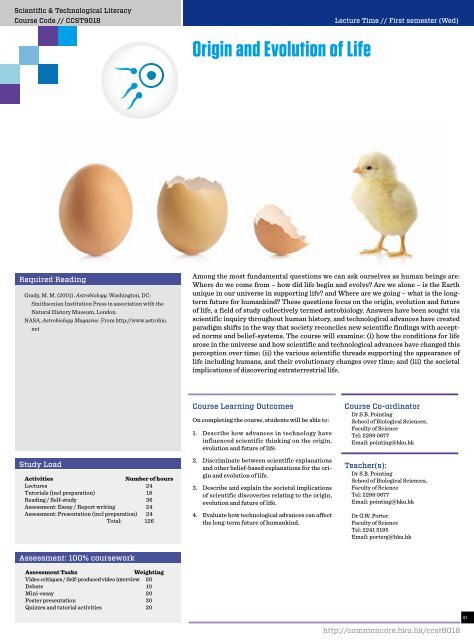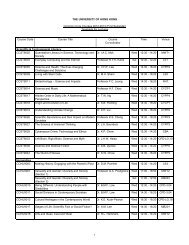handbook - HKU Common Core Curriculum - The University of Hong ...
handbook - HKU Common Core Curriculum - The University of Hong ...
handbook - HKU Common Core Curriculum - The University of Hong ...
You also want an ePaper? Increase the reach of your titles
YUMPU automatically turns print PDFs into web optimized ePapers that Google loves.
Scientific & Technological Literacy<br />
Course Code // CCST9018<br />
Required Reading<br />
Grady, M. M. (2001). Astrobiology. Washington, DC:<br />
Smithsonian Institution Press in association with the<br />
Natural History Museum, London.<br />
NASA. Astrobiology Magazine. From http://www.astrobio.<br />
net<br />
Study Load<br />
Activities Number <strong>of</strong> hours<br />
Lectures 24<br />
Tutorials (incl preparation) 18<br />
Reading / Self-study 36<br />
Assessment: Essay / Report writing 24<br />
Assessment: Presentation (incl preparation) 24<br />
Total: 126<br />
Assessment: 100% coursework<br />
Assessment Tasks Weighting<br />
Video critiques / Self-produced video interview 20<br />
Debate 10<br />
Mini-essay 20<br />
Poster presentation 30<br />
Quizzes and tutorial activities 20<br />
Origin and Evolution <strong>of</strong> Life<br />
Course Learning Outcomes<br />
On completing the course, students will be able to:<br />
1. Describe how advances in technology have<br />
influenced scientific thinking on the origin,<br />
evolution and future <strong>of</strong> life.<br />
2. Discriminate between scientific explanations<br />
and other belief-based explanations for the origin<br />
and evolution <strong>of</strong> life.<br />
3. Describe and explain the societal implications<br />
<strong>of</strong> scientific discoveries relating to the origin,<br />
evolution and future <strong>of</strong> life.<br />
4. Evaluate how technological advances can affect<br />
the long-term future <strong>of</strong> humankind.<br />
Lecture Time // First semester (Wed)<br />
Among the most fundamental questions we can ask ourselves as human beings are:<br />
Where do we come from – how did life begin and evolve? Are we alone – is the Earth<br />
unique in our universe in supporting life? and Where are we going – what is the longterm<br />
future for humankind? <strong>The</strong>se questions focus on the origin, evolution and future<br />
<strong>of</strong> life, a field <strong>of</strong> study collectively termed astrobiology. Answers have been sought via<br />
scientific inquiry throughout human history, and technological advances have created<br />
paradigm shifts in the way that society reconciles new scientific findings with accepted<br />
norms and belief-systems. <strong>The</strong> course will examine: (i) how the conditions for life<br />
arose in the universe and how scientific and technological advances have changed this<br />
perception over time; (ii) the various scientific threads supporting the appearance <strong>of</strong><br />
life including humans, and their evolutionary changes over time; and (iii) the societal<br />
implications <strong>of</strong> discovering extraterrestrial life.<br />
Course Co-ordinator<br />
Dr S.B. Pointing<br />
School <strong>of</strong> Biological Sciences,<br />
Faculty <strong>of</strong> Science<br />
Tel: 2299 0677<br />
Email: pointing@hku.hk<br />
Teacher(s):<br />
Dr S.B. Pointing<br />
School <strong>of</strong> Biological Sciences,<br />
Faculty <strong>of</strong> Science<br />
Tel: 2299 0677<br />
Email: pointing@hku.hk<br />
Dr G.W. Porter<br />
Faculty <strong>of</strong> Science<br />
Tel: 2241 5195<br />
Email: porterg@hku.hk<br />
http://commoncore.hku.hk/ccst9018<br />
41



